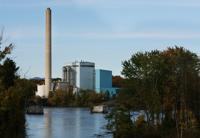HUDSON FALLS — The Wheelabrator trash-burning plant in Hudson Falls is listed as one of the top polluting incinerators in the country for lead…
After 28 years and top 10 polluter ranking trash incinerator should be denied permit.
As incinerator seeks permit renewal, air quality group holds ‘zero waste’ talk and workshop
The Hudson Falls trash burning plant is seeking to renew its air emissions permit, but a local air quality organization is hoping an upcoming talk will show local officials that the incinerator is no longer needed.
Wheelabrator, the company that owns the trash plant, is 28 years old and is listed as one of the top polluting incinerators in the country, according to a national report.
Its spokespeople have continuously fought that image, highlighting how the plant creates electricity from burning garbage and contributes to recycling by separating out metals. The plant also keeps waste out of landfills.
But that hasn’t alleviated the concern that some local residents feel about what the trash plant puts into the air.
The Clean Air Action Network, a new environmental organization started by Argyle resident Tracy Frisch, is hosting a talk by Neil Seldman, director of the Waste to Wealth Initiative at the Institute for Local Self Reliance.
In a phone interview Friday, Seldman said he will cover a variety of topics including the history of recycling in the last decade, an overview of the incineration process and specifically what Warren and Washington counties can do to reduce their amounts of trash.
While based out of Washington D.C., Seldman said his upcoming talk hits home. His wife grew up spending her summers in Warrensburg and Chestertown, and Seldman said “he was particularly very depressed when the incinerator was built years ago.”
“I knew what it was going to do to pollution of the lakes and nature in general in the Adirondacks,” Seldman added.
He believes that local municipalities should pass a clean air law, similar to the one passed in Coeymans, that would phase out any kind of garbage incineration.
A local law that regulates the burning of waste was passed in the town of Coeymans in Albany County last week, bringing mixed reactions from t…
Seldman also recommends that communities implement organic composting or digestion, as about one-third of the entire waste stream is made of organic material.
“If you take organics out of the waste stream, you also reduce the pollution from your landfills, because organic material contains a lot of water,” Seldman said. “Water in the landfill leads to leachate, or the liquid chemicals that come out of the landfill. Organics in the landfill generate a lot of methane, which is a greenhouse gas we’re trying to limit.”
Seldman also will talk about how recycling and composting programs create jobs. He highlighted the importance of electronic scrap and recycling programs, building deconstruction programs, that all lead to jobs with good wages and benefits. He has seen the programs work in communities, and not only have they reduced a trash problem, but they have also lowered several communities’ rates of recidivism.
“There are tremendous social impacts that go beyond environmental issues and solid waste management issues,” Seldman said. “That’s why local officials, you can’t just look at the waste stream. You have to look at the impact of the waste stream on your community. Those local officials who fear that if they get rid of the incinerator, the landfills will fill up, that’s not necessarily true.”
Seldman’s talk will take place at 7 p.m. Thursday, Sept. 12, at the Scoville Auditorium at SUNY Adirondack, 60 Bay Road, Queensbury.
He will also hold a zero waste workshop from 9 a.m. to 12:30 p.m. on Friday, Sept. 13, at the Unitarian Universalist Congregation of Glens Falls in Queensbury. Pre-registration for the workshop is required. To register, call (518) 692-8242or email gfnycaan@gmail.com.

